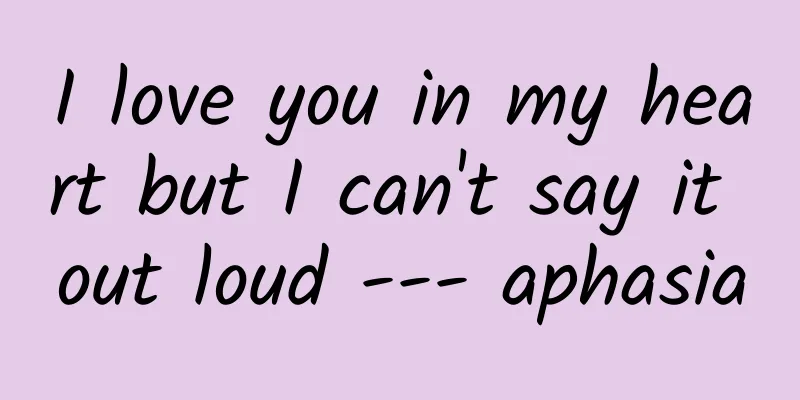I love you in my heart but I can't say it out loud --- aphasia

|
"Speaking" is a simple and easy thing for normal people, but for patients whose brain language center is damaged after a stroke, they often have difficulty speaking and cannot say what they want to say. Common causes of aphasia include cerebrovascular disease, brain trauma, brain tumors, infection, etc., among which stroke is the most common cause of aphasia. Data from the American Aphasia Association show that approximately 25%-40% of stroke survivors suffer from aphasia, and research data in my country show that at least 1/3 of stroke patients may have various speech disorders. What are the symptoms of aphasia? 1. Auditory comprehension disorder: refers to the patient's reduced or lost ability to understand spoken language. The hearing is normal, but the patient cannot understand the language of others or himself. Therefore, although he can speak, his language is chaotic and he often answers questions irrelevantly, so others cannot understand what he says. 2. Oral expression disorder: refers to the patient's reduced oral expression, labored and disorganized speaking, shorter sentences, mostly composed of single words, and frequent word substitutions. Therefore, although the patient can understand what others say, errors, pauses, and difficulty speaking are common during conversations. 3. Dyslexia: Difficulty reading text aloud and understanding its meaning, errors in matching words to pictures, and inability to pair words with objects. 4. Writing difficulties: inability to write, or incorrect written characters or strokes, mirror writing, etc. How to treat aphasia? 1. Targeted training: Before treatment, an assessment should be conducted to evaluate whether the patient has aphasia, the type and severity of aphasia, so as to clarify the direction and goal of treatment. Training can start with the patient's residual functions and gradually improve their language ability. The content of treatment should be suitable for the patient's cultural level and interests. 2. Comprehensive training, focusing on oral language: If listening, speaking, reading and writing are impaired, comprehensive training should be carried out. 3. Pay attention to adjusting the patient's psychological reactions, and use flexible and diverse methods: When the treatment makes progress, encourage the patient, strengthen his confidence, and adjust the difficulty and intensity of the treatment at any time according to the patient's condition during the treatment process. 4. Family guidance and language environment adjustment: Family members should be given necessary guidance on a regular basis so that they can cooperate with the treatment and, supplemented by family rehabilitation, achieve the best results. Speech and Language Comprehensive Trainer Speech and Language Comprehensive Trainer is a device for language ability assessment and training for aphasia. It can conduct modern, standardized and systematic aphasia assessment and training, strengthen language comprehension training and expression ability training, improve language application ability, and help with daily communication. What is included in the aphasia assessment? 1.Comprehension ability assessment includes: auditory comprehension, olfactory comprehension, spatial comprehension, visual comprehension, and tactile comprehension; 2. Expression ability assessment includes: oral expression ability, reading ability, writing ability, body language; right cerebral hemisphere function assessment: expression recognition ability, graphic matching ability, metaphor sentence comprehension ability; What training methods can be used? 1. Comprehension ability training: audio-visual combination, auditory comprehension, visual comprehension; 2. Expression ability training: oral expression and written expression; 3. Comprehensive application: describing pictures, writing stories based on pictures, and thematic dialogues; on the basis of understanding and expression, train the patient's comprehensive language application ability to improve their daily communication skills. Aphasia is not scary, what is really scary is the compromise with suffering, and recovery also brings hope. "Never give up, never abandon", believe that there will always be a miracle! |
<<: What strait is Singapore near? What is Singapore also known as?
>>: The cold wave is coming, here are some tips to keep warm in winter
Recommend
What to check at 9 weeks of pregnancy
A pregnant woman who is already nine weeks pregna...
Why are women's palms thin?
Generally speaking, if a woman's palms are to...
What to do if you bleed before your period?
Generally, women experience vaginal bleeding on f...
What symptoms do you experience before your period?
A woman's menstrual cycle is about every 30 d...
How to cook pork liver delicious and tender? How to stir-fry pork liver
Fried pork liver is a common home-cooked dish. In...
White bubble on nipple during breastfeeding
The lactation period is a very important period. ...
What color curtains should I choose for black and white? What color furniture should I choose for black and white?
We all know that decoration is a complicated matt...
What causes dark brown and sticky menstrual discharge?
Menstrual problems are a big problem that trouble...
How to treat hair loss in women?
In today's society, women are often under tre...
Can I take a shower before an abortion?
Abortion is an artificial method of terminating p...
Dull pain near right pelvis
Pain at the human body level can have a great imp...
Women have recurring acne on their chin
It is a problem that many women often encounter t...
What does right-rotated uterus mean?
Dextrorotation of the uterus occurs in the late s...
What is dysmenorrhea?
For many girls, dysmenorrhea happens every month....


![[World Parkinson's Day] The appearance of these 10 symptoms may not mean you are old, but may be early signs of Parkinson's disease!](/upload/images/67f1455cc23f4.webp)






